'Shut it down': Every Sunday, they come to pray outside Alligator Alcatraz
Published in Religious News
MIAMI — As thunder boomed on an ominous Sunday evening just outside of Alligator Alcatraz, over 200 people — most of them reverends, rabbis, pastors and people of assorted faiths — chanted in unison, “Shut it down” and “This is a preserve, not a prison” as cars and trucks zoomed behind them on Tamiami Trail.
Clergy alternated in leading prayers and shared personal stories about their connections to immigrants. People in the crowd held signs quoting scripture. Some wore religious vestments. Many speakers denounced what they view as inhumane treatment of the people behind the gates of what used to be isolated airstrip near the Big Cypress National Preserve.
For the third Sunday in a row, a crowd gathered for what’s become a growing weekly protest outside the controversial immigration detention center. The hour-long weekly vigils have brought out faith leaders and followers from all parts of South and Central Florida to offer prayers for detainees and speak out against Florida’s decision to construct the camp in the middle of the Everglades.
For many, their hope is to grow opposition against not only Alligator Alcatraz but immigration policies they believe violate the tenets of their faiths, whether it be Christian, Jewish, Muslim or something else deeply spiritual.
“We must fight for full rights for immigrants,” said Nick Gary, political coordinator for Faith in Florida, a coalition of over 900 congregations throughout Florida. “And what I beg of you as you leave this place today, do not keep what you saw today to yourself. I need each and every one of you to talk to three people and tell them what you saw and say, ‘I may not know how to fix it, but let’s figure it out together.’”
For Betty Osceola, one of the original organizers of the vigil and a member of the Miccosukee Tribe of Indians of Florida, the goal was to simply restore empathy for others detained in the middle of what tribal members consider sacred ground..
“People coming back to their humanity is what’s going to stop this,” said Osceola. “I prayed and asked, ‘What do you need me to do?’ When I heard that voice in the wind tell me that I need human beings again, that was my commitment to creator … to help people to be human beings again, to get back to their humanity.”
She said after she hosted the first spiritual vigil at the beginning of August, the movement has since been growing, with more and more churches and places of worship committing to the cause each week.
“I thought that was very powerful, the fact that just that initial prayer, that seed got planted. Now it’s growing,” she said.
Miami pastor Rev. Juan del Hierro showed up with 44 people from his church, Unity on the Bay, an inclusive “spiritual community” that holds services in Temple Israel of Greater Miami but is relocating to a new location in Miami Gardens next year. Hierro said he came to the United States at age 7 and moved through the citizenship process with his family. He said he couldn’t “fathom what that would be like or feel like in these moments.”
“Every person, no matter where they come from, no matter their immigration status, is a child of God,” Hierro said as cars honked behind him in the distance. “We know that when human beings are treated as less than, it is not only them who suffer, it is our collective humanity that may be diminished.”
Rabbi Jessica Jacobs of Temple Beth Sholom in Miami Beach echoed a similar message to Hierro’s but from the Jewish tradition.
“The Torah teaches us that every human being is ‘B’tzelem Elohim’ — created in the image of God — and therefore we should treat every human being as if we each have a spark of divinity in us,” said Jacobs. “The holiness of a human is not linked to their immigration status, or their birth place, their language of origin, their ethnicity, or their job.”
Many speakers cited scripture, from the Bible and the Torah, to show that their opposition to the center comes from a place of faith and morality. Some said the very existence of the detention center violates their religious beliefs.
The speeches made by faith leaders gathered on Sunday stood in stark contrast to the stance of many Christians — particularly evangelicals who were among the most vocal about their support for President Trump — who have been supportive of his administration. However, Trump’s immigration policies and deportation tactics have been a point of contention among evangelicals, with some speaking out against them while others continue to defend his strict border policies.
Organizer Rev Brittany Leclair of First United Methodist Church of Pinellas Park said at least 100 of the attendees traveled together by bus from the Tampa Bay area.
“It’s the morality and abuse of human dignity, we all believe different things and have a different higher power but we all agree that human dignity and the sanctity of life is very important so that’s what’s bringing us together,” said Leclair. “I think that has the power to unite us as a nation as well.”
For Rev. Esther Robles, a pastor from the First United Church of Tampa, the hours-long trip was worth it to speak out against the center.
“It’s an inherent violation of the dignity of God. The image of God has been violated,” Robles said. “There’s no due process. People have been arrested and snatched from the streets.”
Robles, who said she came to Miami representing 300 Hispanic churches within the United Church of Christ denomination, said she’s heard of many cases in which people are not attending church or even medical appointments out of fear of running into immigration deportation officers. She said that there’s a “general air of fear” among Hispanics right now.
Rev. Angela Wells-Bean, senior pastor at at Pass-a-Grille Beach Community United Church of Christ in St. Petersburg, spoke to the crowd about how her great grandparents came to the United States seeking a better life for themselves and their children. “The people detained here at alligator Alcatraz are no different from my great grandparents,” she said.
“The egregious treatment of those in this detention facility show us that the problem is not with those who have come here from other nations, but with those who reside here in this land who call this nation home, who exert power and influence in this country supposedly legitimately, yet deny due process to those trying to make a home here,” said Wells-Bean.
Yaakov “Jake” Geffon, a member of the Progressive Jewish Coalition of Central Florida, said he made the trek to the Miami vigil, in part because of his Jewish faith.
“Jewish faith commands me every single step of the way to be here. Judaism is not just a faith ... it’s not just about belief. It’s not just about worrying about what happens when we die. It is a series of commandments to action that we embody through every moment of our lives,” Geffon said.
Another person of faith who traveled from Central Florida, Aida Mackic from the Islamic Society of Tampa Bay, said she feels that the Trump administration’s immigration policies have divided many people.
“When you have an administration that has consistently made this community fear one another rather than recognize the humanity in one another. I think that’s where the division starts,” she said.
Mackic, who also works with the American Civil Liberties Union, said she recalls the Muslim ban from President Trump’s first term, and remembers when people from Jewish and Christian faith backgrounds spoke out in opposition of that policy. She said she feels it’s her duty to do the same with the detainees.
“To see this, to see our communities torn and treated so inhumanely with no dignity, speaks against every faith, not just Muslim or Christian. I believe in every spiritual faith that it’s totally against everything that we believe in,” Mackic said.
The detention center, which opened on July 2, is now facing a potential temporary shutdown. Last week, U.S. District Judge Kathleen Williams said that she plans to rule no later than Aug. 21 on a request to temporarily shut the detention center down, following days of testimony about the environmental impacts of the Everglades detention camp.
Paula Muñoz, an organizer with the Florida Student Power Network, said she started coming to the vigils after being inspired by Betty Osceola’s activism. Muñoz became emotional recalling her experience working with students in Florida.
“I started coming here because I didn’t know what to say to the students,” she said. “I had so much rage because I couldn’t understand, as a woman of faith, as an Evangelical, how my people have voted for this. I couldn’t understand it.”
©2025 Miami Herald. Visit at miamiherald.com. Distributed by Tribune Content Agency, LLC.
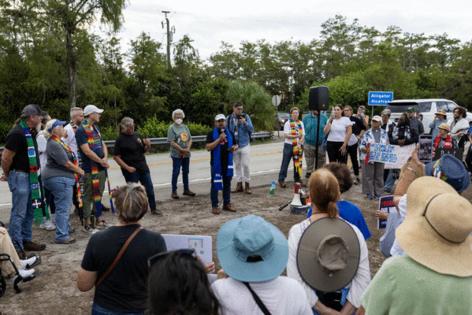
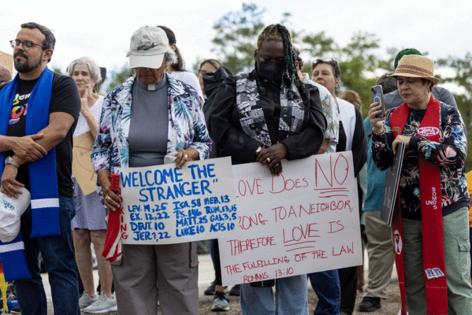
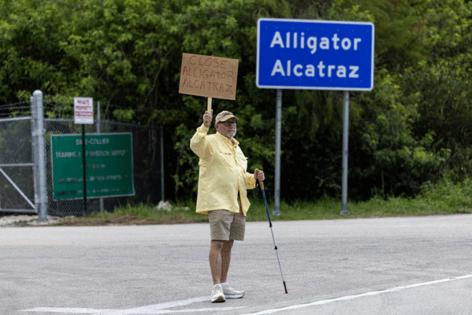
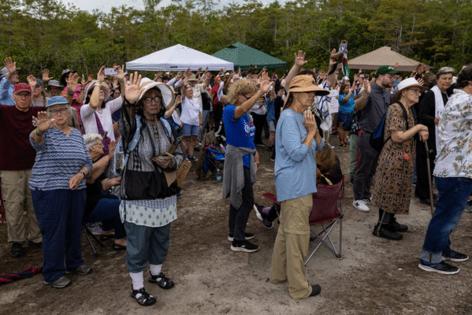
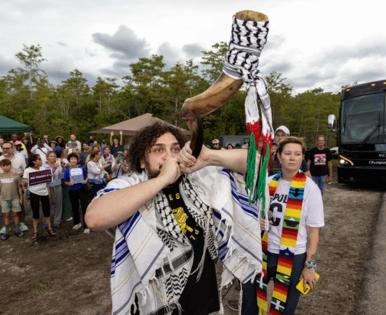













Comments